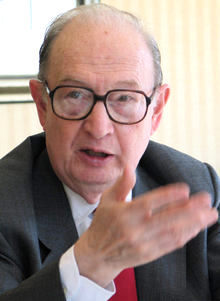 |
Specifically, Lantos criticized the Administration for blocking several projected visits by Hill to North Korea, urging that Hill go to Pyongyang after the expected next round of six-party talks, "not to negotiate a new and separate deal, but rather to demonstrate to Pyongyang our peaceful intent." Democratic leaders believe that they have a resounding mandate for a new Iraq policy: get out as soon as possible, on a timetable designed to minimize the resulting chaos, but get out even if the situation in Baghdad cannot be stabilized before the pullout, and let the Iraqis fight it out. By fixing a timetable, the Democrats argue, the U.S. would force the Iraqis to begin reconciling their differences and would remove the United States as a target for Iraqi insurgents. The emerging concensus among Democratic leaders is that the withdrawal should begin within six months and should be linked with broader changes in U.S. policy, both inside Iraq and in U.S. dealings with neighboring Iran and Syria. Within Iraq, Senator Biden has been pushing for the replacement of the existing constitutional structure in Baghdad with a new confederated structure that would give autonomy to Shia, Sunni, and Kurdish regional governments. Together with Senator Carl Levin, Chairman of the Senate Armed Services Committee, Biden is also pushing a proposal for U.S. negotiations with Iran and Syria, both bilateral and in a regional conference. There is no consensus yet among proponents of the projected regional conference concerning which countries should attend, and whether the meeting should be convened by the United Nations or by the United States. Biden wants Iran, Syria, Turkey, and "all major Iraqi factions" to participate, with "an oversight group of major countries" assigned by the conference to "hold the neighbors to their commitments." It has long been obvious that Iraq can only be stabilized with the cooperation of Iran and Syria, but the Bush administration is reluctant to seek their cooperation because Teheran and Damascus would ask for U.S. concessions in return for cooperation. What Iran and Syria both want above all is an end to the "regime change" policies of the Bush White House. In Iran, this would mean stopping the CIA's efforts to stir up the disaffected Kurdish, Baluch, Azeri, and Khuzistani Arab ethnic minorities against the Ahmadinejad government. In Syria, it would mean U.S. efforts to restrain the United Nations' punishment of high officials of the Syrian regime that are charged with having organized the assassination of Lebanon President Rafiq Hariri. Above all, the White House fears that Iran would ask for regional security concessions, not only formal security guarantees ruling out "regime change" but also reductions in the U.S . force deployments that encircle Iran in the Persian Gulf and Afghanistan. Iran would be certain to demand a stop to ongoing U.S. preparations for a permanent U.S. base presence in Iraq. The American Prospect magazine exposed these preparations in its November issue, citing contracts that have been awarded to erect a new permanent base in Baghdad in addition to the existing one; plus additional bases at Balad in the central Sunni belt; Tallil in the southern Shia area; and Rawah on the western border with Syria. All four are being linked up in a communications network, headquartered at Fort Monmouth, New Jersey, known as the Central Iraq Microwave System. Instead of a temporary system built on satellite signals, the new grid will use land-based communications towers and underground fiber-optic cables, signaling plans for a permanent U.S. presence. Will the Bush administration give up these plans and bend to pressure from Congress and moderate Republican pragmatists like former Secretary of State James Baker, who co-chairs a Congressionally-appointed Iraq Study Group that is expected to make recommendations next month similar to those of Biden? Perhaps not. But the pressure for change will undoubtedly intensify as it becomes increasingly clear that Iraq could dominate the 2008 Presidential election, threatening Republican prospects, if the U.S. is still bogged down there. The Democrats hope to put the current administration on the defensive by pushing economic issues popular with low-income voters and by responding to growing public concern over global warming. Senator Barbara Boxer, the new chair of the Senate Environment Committee, is planning to push legislation mandating higher carbon dioxide emission standards. According to the Zogby Poll, 58 percent of voters want Congress to make action on global warming a high priority. What happens in the coming struggle between a Democratic-dominated Congress and the White House will have important repercussions beyond U.S. shores. As Professor Abdulhaleq Abdullah of Dubai University told The Financial Times, "There is no check on American power today except the check inside America. The outside world is helpless, even Europe, Russia, and China. It was about time for the American people to step in and return to sanity."





